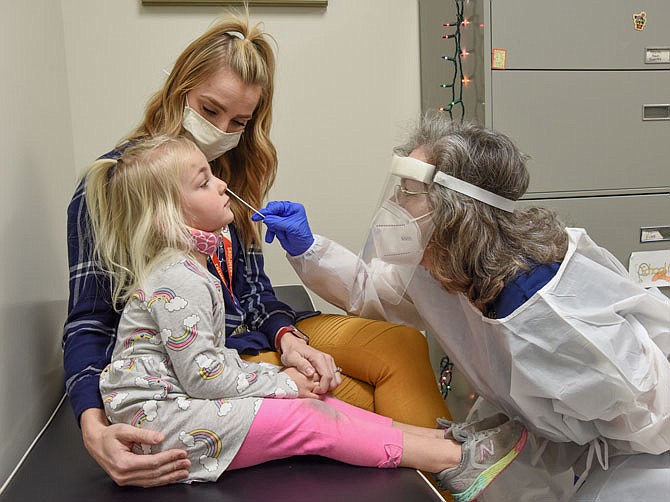In some Mid-Missouri schools, rapid COVID-19 tests have eliminated the need to quarantine while waiting for test results, allowing students and staff to return to school quickly.
Cindy Henderson, a school nurse at St. Joseph Cathedral School in Jefferson City, said she has administered about 42 rapid tests at the school since December, and only a few were positive.
St. Joseph students and staff have the option for a rapid test if they have had COVID-19 symptoms for at least 24 hours.
"When we were offered this, it was quite obvious to me as a nurse that I knew kids needed to be in school, and I wanted to help facilitate that for the kids and the families and the teachers," Henderson said.
The biggest benefit of the rapid tests is they allow students to learn in person as much as possible instead of being in quarantine, St. Joseph Principal Spencer Allen said.
"This has really aided our efforts because we can get students back in their seats sooner, we can do it in a responsible way, and they're back where they need to be to be able to learn along with their peers," he said.
The tests are administered by health professionals after parental or guardian consent, with results available in about 15 minutes.
"We are aware of the challenges and the damage that have come to the educational process from the distance learning last year, and so we're doing our part to - as responsibly as possible - keep kids in school, keep them learning on site," Allen said.
Administering rapid tests at school is also beneficial to the community at large, Allen said.
"We know that a lot of health care providers - especially when the numbers were higher - were really being over stressed with the amount of people who are needing testing, so we can be one more outlet to help families get that testing and to reduce the congestion at those sites," he said.
Some schools administer the tests on-site, while others have partnered with local health organizations.
The Cole County R-1 and Cole County R-5 school districts in Russellville and Eugene partner with their health insurance providers to provide tests to their staff at clinics in Jefferson City. They do not offer tests to students.
Staff members in these districts who have COVID-19 symptoms have the option for a rapid test.
Cole County R-5 Superintendent Dawna Burrow said the district applied for the rapid tests to save time and effort.
Before having the option to use rapid tests, some staff members waited up to six hours to receive a test then waited three days for the results. They had to quarantine while waiting for results, and the district had to find a substitute.
At schools that have classified teachers as essential employees, including St. Joseph and Cole County R-1, staff can receive a rapid test if they are identified as a close contact of a COVID-19 case and are in quarantine. If they test negative, they can return to work on day seven of their quarantine period if they have no symptoms and follow CDC guidelines such as wearing a surgical mask and having their temperature checked regularly.
The tests are distributed as part of a program Missouri schools and districts - both public and private - could apply to in order to receive up to one free Abbott's BinaxNOW rapid antigen test per student and staff member. The federal government allocated a certain number of tests for each state.
To be eligible for the program, districts and schools had to agree to have medical professionals administer the test, complete certain training and documentation, be able to store the maximum number of tests requested, and have a process in place for disposal of infectious waste, among other criteria, according to the Missouri Department of Health and Senior Services.
All test results are reported to DHSS within 24 hours of the test being administered.
These Mid-Missouri schools districts participate in the rapid testing program, according to the Missouri Department of Elementary and Secondary Education: Cole County R-1 in Russellville, Cole County R-5 in Eugene, Columbia, Eldon R-1, Fulton, Osage County R-2 in Linn, Osage County R-3 (Fatima) in Westphalia, St. Elizabeth R-4, Miller County R-3 in Tuscumbia, Maries County R-1 in Vienna, Moniteau County R-1 in California, Morgan County R-1 and R-2 in Stover and Versailles, New Bloomfield R-3, South Callaway R-2 in Mokane and Tipton R-6.
Four parochial schools under the Catholic Diocese of Jefferson City also participate: St. Joseph Cathedral School, Our Lady of Lourdes Interparish School in Columbia, Sacred Heart School in Sedalia and St. Joseph School in Westphalia.
Some schools, including the Jefferson City School District, Blair Oaks R-2 School District and Helias Catholic High School in Jefferson City, chose not to apply for rapid tests. Officials from each said their current testing procedures are adequate, it would add unnecessary extra responsibilities for staff, and it would go against their COVID-19 safety procedures, which discourage staff and students who are feeling sick from coming to school.
To view all participating districts and schools, how many tests each requested, the status of the statewide shipments and how many tests have been used by each, visit DESE's K-12 Antigen Testing Program dashboard/visualization at dese.mo.gov.

